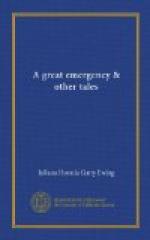And Mother used to say, “That’s just the way your poor father used to go on! As if it wasn’t enough to have to run the risk of being killed or wounded once or twice yourself, without bothering your head about battles you’ve nothing to do with.”
And when he did the battle in which my father fell, and planted the battery against which he led his men for the last time, and where he was struck under the arm, with which he was waving his sword over his head, Rupert turned whiter than ever, and said, “Good Heavens, Henrietta! Father limped up to that battery! He led his men for two hours, after he was wounded in the leg, before he fell—and here I sit and grumble at a knock from a cricket-ball!”
Just then Mr. Bustard came in, and when he shook Rupert’s hand he kept his fingers on it, and shook his own head; and he said there was “an abnormal condition of the pulse,” in such awful tones, that I was afraid it was something that Rupert would die of. But Henrietta understood better, and she would not let Rupert do that battle any more.
Rupert’s friends were very kind to him when he was ill, but the kindest of all was Thomas Johnson.
Johnson’s grandfather was a canal-carrier, and made a good deal of money, and Johnson’s father got the money and went on with the business. We had a great discussion once in the nursery as to whether Johnson’s father was a gentleman, and Rupert ran down-stairs, and into the drawing-room, shouting, “Now, Mother! is a carrier a gentleman?”
And Mother, who was lying on the sofa, said, “Of course not. What silly things you children do ask! Why can’t you amuse yourselves in the nursery? It is very hard you should come and disturb me for such a nonsensical question.”
Rupert was always good to Mother, and he shut the drawing-room door very gently. Then he came rushing up to the nursery to say that Mother said “Of course not.” But Henrietta said, “What did you ask her?” And when Rupert told her she said, “Of course Mother thought you meant one of those men who have carts to carry things, with a hood on the top and a dog underneath.”
Johnson’s father and grandfather were not carriers of that kind. They owned a lot of canal-boats, and one or two big barges, which took all kinds of things all the way to London.
Mr. Johnson used to say, “In my father’s time men of business lived near their work both in London and the country. That’s why my house is close to the wharf. I am not ashamed of my trade, and the place is very comfortable, so I shall stick to it. Tom may move into the town and give the old house to the foreman when I am gone, if he likes to play the fine gentleman.”
Tom would be very foolish if he did. It is the dearest old house one could wish for. It was built of red brick, but the ivy has covered it so thickly that it is clipped round the old-fashioned windows like a hedge. The gardens are simply perfect. In summer you can pick as many flowers and eat as much fruit as you like, and if that is not the use and beauty of a garden, I do not know what is.




